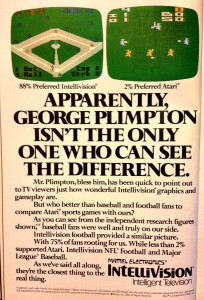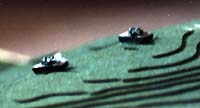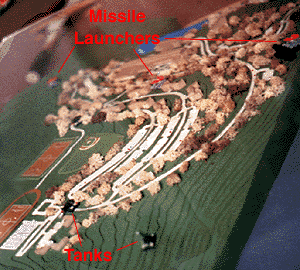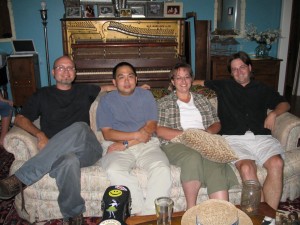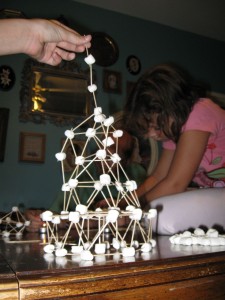Sundays too my father got up early
and put his clothes on in the blueblack cold,
then with cracked hands that ached
from labor in the weekday weather made
banked fires blaze. No one ever thanked him.
I’d wake and hear the cold splintering, breaking.
When the rooms were warm, he’d call,
and slowly I would rise and dress,
fearing the chronic angers of that house,
Speaking indifferently to him,
who had driven out the cold
and polished my good shoes as well.
What did I know, what did I know
of love’s austere and lonely offices?
– Robert Hayden, “Those Winter Sundays” (via Bob Fischer)
My father and I had a contentious relationship during my growing-up years. He and my mother divorced when I was six, and weekends with him devolved over the years from fun to difficult to dreadful.
There were some good times: discovering Doctor Who together. Going down to Brackenridge Park where he showed my brother and me how to trigger the crossings for the miniature trains, slowing baffled motorists. Building small wooden boats out of scrap and chasing them down the gutters during a rainstorm. Eating imprudent amounts of Taco Bell after church. Afternoons at Lake McQueeney with my step-mother and her family.
But those good times were too often overshadowed by conflict. When I was young, the stakes were fairly small and our battles correspondingly benign. My refusal to try three bites of everything on my plate resulted in long hours at the dinner table (and late night surreptitious runs, often intercepted, to the kitchen for crackers and tuna). My reluctance to help around the house brought loss of Star Trek privileges. And my arguments with my step-mother over the utility and value of dish soap caused difficulty for him as he tried to support his wife while attempting to keep a straight face.
When I graduated to my teenage years, things got tougher. Though he didn’t impose a curfew, I thought it absurd and unreasonable that he would require me to call to let him know where I was. I balked with a mule’s stubbornness at lending any kind of help with household chores. I was loudly exasperated and petulant whenever he planned something for the family that interfered with what I wanted to do.
These bigger battles resulted in more substantial casualties. For a period of time, I got into a shouting match with my dad nearly every weekend my brother and I went to visit. When those arguments escalated enough, I would stalk out of the house, walking miles to stay with friends, dodging behind dumpsters to keep my dad from spotting me as he scoured the neighborhood in his blue pickup truck. One memorable time, my dad pinned me to the floor with enough vigor that my retainer popped out of my mouth and sat on me until my defiance was temporarily exhausted. Even when quiet descended on the house, it was a Cold War, with the threat of explosion hanging heavy over us all.
At the time, the only way I knew how to interpret my dad’s actions were as a tyrannical dictator, only interested in keeping his power unchallenged. (And with the zeal of a misguided freedom fighter, I rose to challenge it at every opportunity.) But as time has passed and I’ve had kids of my own, I’ve gained some perspective on those difficult times. While his approach wasn’t always optimal, I now understand how much of what he did during that span was motivated by love; not a sentimental sort, but a hard-edged, steely desire for my ultimate goodness and well-being. As C.S. Lewis said, “Love is not affectionate feeling, but a steady wish for the loved person’s ultimate good as far as it can be obtained.”
With that additional perspective, I want to thank my dad for arguing with me when I was wrong. For making me sit at the table for eight hours until I finished my zucchini. For having my brother and I over every other weekend when I gave him every reason not to. For disabusing me of the notion that I was the most important and smartest person in the world. For miles driven in that blue pickup looking for me (again). For disconnecting the TV when I was being an ingrate (also again). For sticking around when there must have been no small temptation to disappear across the country. For never giving up on me even when it would have been the far easier course. For being more interested in giving me what I needed than what I wanted. And for all the other lonely offices of love that I still, to this day, haven’t recognized.
Thanks, in short, for being a father, and for teaching me something of how to do the same.

